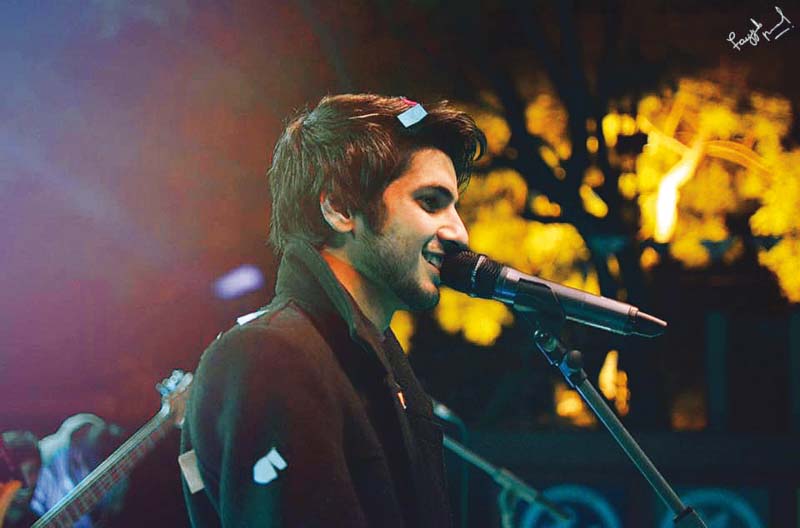
Gone are the days when musicians would turn up at the doorsteps of producers with demos in hand, hoping to secure an invitation to the recording studios. With the advent of YouTube, followed by the meteoric rise of Justin Bieber who was actually discovered on the video streaming portal, the rules of the game seem to have changed a bit. While there have been many examples of international artistes like Boyce Avenue and Tyler Ward emerging through YouTube ranks, there aren’t many such specimens here in Pakistan, barring comedian-rapper Ali Gul Pir.
Nearly four years ago — around the time YouTube was breathing its last for a long time to come — the career of musician Abdullah Qureshi was just about to take off. But with the website no longer accessible in Pakistan, he was forced to adapt a new approach to his music. Having started out as a cover musician in 2010, Qureshi first came under the spotlight as a YouTube artist recording his own renditions of famous singles within the conformity of his room. But his audience base was increasing with each release and something had to be done about it.
Patari continues to keep it real

Speaking to The Express Tribune, Qureshi recalled how his earlier endeavours managed to catch the eye of Walnut Studios, culminating in an invitation to Lahore for multiple recording sessions. “Not only were they recording tracks in a proper studio, they were also filming music videos,” said Qureshi fondly, adding that Walnut gave him the opportunity of a lifetime.
But like all good things, Qureshi’s impressive run on YouTube came to an end when the Pakistan Telecommunication Authority (PTA) decided to ban the website. Like many of his contemporaries, the Awaz Do singer was forced to close shop and relocate on Facebook. However, while he was definitely jolted by the setback, Qureshi took it in his stride and the change of platforms actually afforded the opportunity to reassess his musical career. “When I shifted to Facebook, I re-evaluated the direction in which my musical career was heading and decided to move away from cover tracks. I did not want to be recognised as just a cover artist,” he proclaimed.
Fortunately, it didn’t take the self-taught singer much time to find his feet on Facebook but Qureshi does acknowledge the impact the YouTube ban had on his career. “The real tragedy that happened at that time was that all music channels were also shutting down then and ceased to play Pakistani content,” he lamented. “So the only source of income left for musicians was live performances as (unlike on YouTube) we couldn’t make money from Facebook through our videos.”
Therefore, Qureshi is a firm supporter of music streaming portals like Taazi and Patari which offer others like him a glimmer of hope in the form of royalties. “These portals have implemented a model that wasn’t there previously. For any musician, even earning just Rs10 for their song brings a great deal of satisfaction,” he emphasized. Resentful of how most people are still unaware of the availability of the websites, Qureshi also reiterated that it was important to inform others about them.
Interestingly, Qureshi only came to mainstream attention just recently, despite having been involved in the underground music scene for the better part of the last six years. Arguably, his big break was his appearance on the music show Nescafe Basement, where he sang the single Awaz Do. “I had actually accompanied a friend who was auditioning for the fourth season of Nescafe Basement,” shared Qureshi. “I was over there only to support him. But then I met Xulfi bhai (the producer) who told me that he had heard some of my songs and we just hit it off.” Qureshi went on to describe his collaboration with Xulfi as a “fan boy moment.”
What was even better was the duo choosing to work on a rock song together, unlike Qureshi’s initial discography, which mainly contains soft pop music. “I played out this riff (on my guitar) and Xulfi loved it. He encouraged me to do something different. So the track went onto develop an anthem feel,” said the Islamabad-based musician. Most of all, what really excited Qureshi was the exposure that the next generation of musicians received working under the tutelage of a maestro like Xulfi. “Playing alongside some of the best next-gen musicians like guitarist Hasan Zafar and drummer Bilawal Lahooti is by far the best aspect of the show. These people are the torchbearers of the Pakistani music industry,” he said.
Qureshi is currently collaborating with Patari for the Patari Aslis venture and recently released a track titled Intezaar. And while he is keen on releasing more singles, the idea of a full-fledged album has not crossed his mind yet. Aside from this, the singer also hopes to study music abroad. “I studied Mass Communication at National University of Science and Technology (NUST) for four years,” said Qureshi. “Now I want to study something I enjoy and am passionate about, like music production.”
Published in The Express Tribune, March 9th, 2016.
Like Life & Style on Facebook, follow @ETLifeandStyle on Twitter for the latest in fashion, gossip and entertainment.

1722586547-0/Untitled-design-(73)1722586547-0-165x106.webp)


1732326457-0/prime-(1)1732326457-0-165x106.webp)
1732308855-0/17-Lede-(Image)1732308855-0-270x192.webp)











COMMENTS
Comments are moderated and generally will be posted if they are on-topic and not abusive.
For more information, please see our Comments FAQ